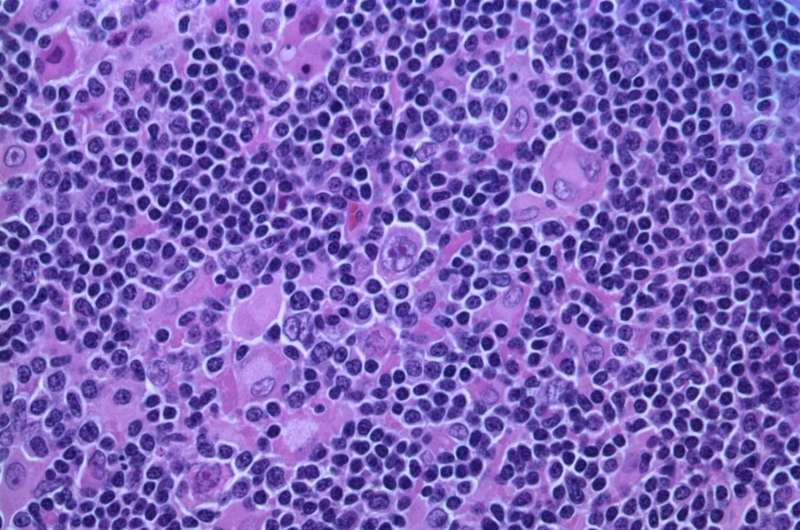Hodgkin lymphoma, nodular lymphocyte predominant (high-power view) Credit: Gabriel Caponetti, MD./Wikipedia/CC BY-SA 3.0
Some patients with aggressive lymphomas face a rare but clinically challenging prognosis when their cancer spreads to the central nervous system (CNS) or relapses there.
Known as secondary CNS lymphoma or SCNSL, it can occur during or after initial chemotherapy treatment and is often associated with disappointing outcomes. Although it only occurs in about 4% to 6% of patients with the most common lymphoma, large-B cell lymphoma, its incidence jumps to almost 20% of patients with Burkitt lymphoma, a rarer and highly aggressive form of the disease.
In a newly published paper in Blood, researchers from Sylvester Comprehensive Cancer Center at the University of Miami Miller School of Medicine and collaborating organizations clarify current treatment approaches in the management of patients with SCNSL caused by aggressive lymphoma.
"Secondary CNS lymphoma is a challenging condition associated with shorter survival rates in a significant number of patients," said Juan Alderuccio, MD, a Sylvester hematologist and lymphoma specialist, and the manuscript's corresponding author.
He and his research colleagues noted that patients with SCNSL were largely excluded from clinical trials testing novel agents in aggressive lymphoma with current recommendations originating from retrospective and single-arm studies. However, results reported from regimens used in the international MARIETTA study as well as other immunochemotherapy regimens followed by consolidation with autologous stem cell transplant show improved outcomes in those with SCNSL at presentation or isolated CNS relapse.
"For patients experiencing accompanying systemic with CNS lymphoma relapse, their prognosis can be especially bleak. However, there may be hope on the horizon for these patients with development of potentially effective therapies such as antiCD19 CAR T-cell therapy," Alderuccio said, explaining that this approach has been associated with encouraging preliminary efficacy. However, the duration of response is presently unknown.
He pointed out that CAR T-cell therapy preliminarily demonstrated very good outcomes in treating large B-cell lymphoma with CNS involvement without causing higher neurotoxicity, a frequent complication of this therapy.
"At Sylvester, we are currently evaluating the genomic landscape and role of circulatory biomarkers to better risk-stratify and track treatment response at a molecular level in patients with SCNSL," Alderuccio concluded. "Our lymphoma group is also developing clinical trials in this difficult-to-treat population to improve outcomes."
More information: Juan Pablo Alderuccio et al, How I treat secondary CNS involvement by aggressive lymphomas, Blood (2023). DOI: 10.1182/blood.2023020168
Journal information: Blood
Provided by Sylvester Comprehensive Cancer Center























